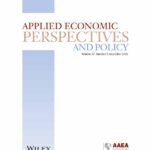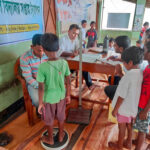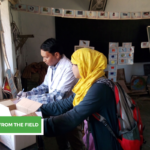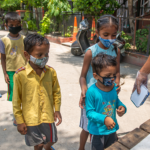Tag: Soumya Gupta

Multisectoral Convergence of Food, Nutrition and Sanitation Programs for Child Health: Evidence From Country-Level Programs in India
Abstract This paper underscores the critical role of multisectoral convergence in enhancing child health, particularly in addressing anemia, a micronutrient deficiency linked to both diet and sanitation. We explore how the integration of nationwide food and nutrition programs with sanitation initiatives impacts anemia in Indian...

Interministerial Coordination Can Boost India’s Fight Against Anemia
A new Tata-Cornell Institute for Agriculture and Nutrition (TCI) study on the impact of government nutrition and sanitation programs on anemia in India underscores the importance of a systematic approach that leverages all available pathways to reducing the disease.
In…

Women’s Empowerment and Intra-Household Diet Diversity Across the Urban Continuum: Evidence from India’s DHS
Abstract Read a policy brief based on this study. Women’s empowerment has been associated with improved nutritional outcomes in various settings. However, the gains from empowerment do not necessarily accrue to different members of the same household in the same manner. Furthermore, the relationship between...

Empowerment Programs Can Improve Nutrition of Women Left Behind by India’s Urban Transformation
New research from the Tata-Cornell Institute for Agriculture and Nutrition (TCI) reveals that Indian efforts to improve household nutrition through women’s empowerment could have a greater impact with a more targeted approach that takes into account different levels of urbanization. …

Notes From the Field: Giving Back to the People You Study
For my doctoral dissertation, I ventured into the field to explore the role that women’s empowerment in agriculture can play in determining their iron status. In addition to collection of survey data on agriculture, empowerment, and other socioeconomic variables, blood…

Did the COVID-19 Lockdown Reverse the Nutritional Gains in Children? Evidence from Rural India
Abstract Read a policy brief based on this study. To address the missing link that goes beyond the changes in dietary consumption and food expenditures to assess the impact of the pandemic on child undernutrition, specifically anthropometric outcomes, this paper uses primary panel data (pre-...

COVID-19 Pandemic Linked to 14% Increase in Underweight Children in India
The nutrition of Indian children suffered dramatically during the COVID-19 pandemic, according to new research from the Tata-Cornell Institute for Agriculture and Nutrition (TCI) that found a sharp rise in underweight children.
In a study published in Economic and Political…

Leveraging Men’s Education as an Effective Pathway for Improving Diet Quality: Evidence from Rural India
Abstract Read a policy brief based on this study. Investing in nutrition-sensitive sectors such as education can be an effective strategy for combatting malnutrition. In this paper, we analyze the role that men’s education plays in determining dietary diversity outcomes using primary data from 3600...

Well-Educated Men Mean Well-Nourished Households
Among development practitioners and policymakers, women’s education is a key tool for improving household nutrition, but according to new research from the Tata-Cornell Institute for Agriculture and Nutrition (TCI), men’s education also plays an important role in improving the nutritional…

Alumna Pursues Gender and Nutrition Research at TCI
As a young girl, Soumya Gupta would accompany her father to the hospital, where he worked as a doctor. The image of impoverished women waiting for healthcare services in long queues impacted her deeply. She decided that one day, she…

